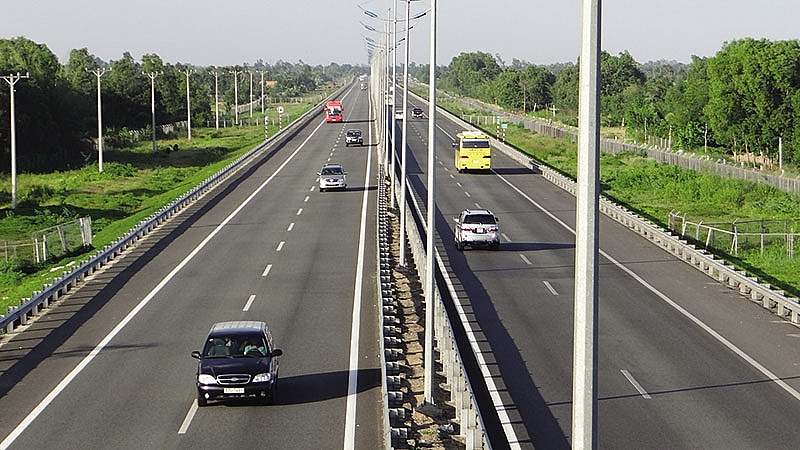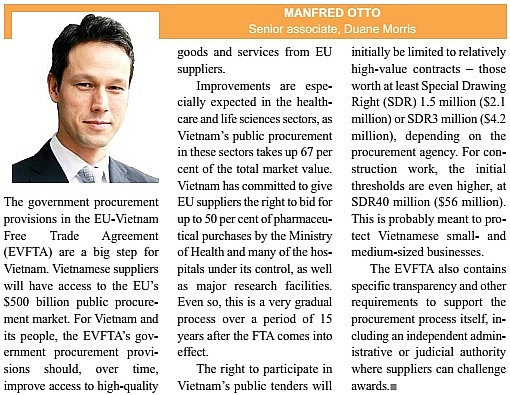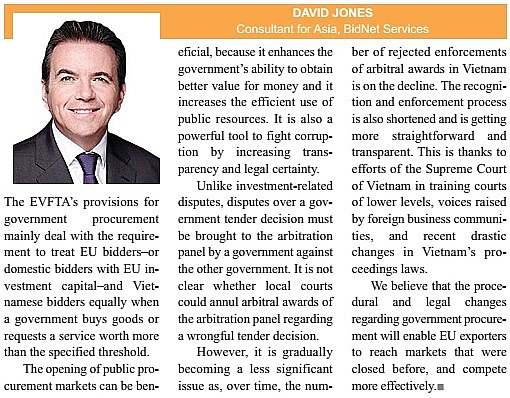EU firms to bid on public contracts
 |
| EU firms want to benefit from public procurement in infrastructure and other sectors, Photo: Le Toan |
At a recent teleconference between the government and ministries and localities, Minister of Industry and Trade Tran Tuan Anh announced that the EU-Vietnam Free Trade Agreement (EVFTA) will be signed in October or November this year, and is expected to take effect early next year.
After the deal comes into force, EU companies will, for the first time, be able to bid for public procurement contracts in Vietnam under the same conditions as Vietnamese companies, for a selective number of entities (see box). Currently, EU firms are not allowed to engage in bidding activities for government-funded projects.
Public procurement is about how public authorities spend public money when buying goods, works or services. This can range from buying IT equipment or providing water, gas and electricity, to building a hospital or a road.
| The entities with which EU firms will be able to bid for public procurement contracts include - All Vietnamese ministries as well as the Committee on Ethnic Minority Affairs and the Government Inspectorate. - Two key utility-related state-owned enterprises – Electricity of Vietnam and Vietnam Railways. - Thirty-four public hospitals directly under the control of the Ministry of Health. All pharmaceuticals purchased by the Ministry of Health, the departments of Health of Hanoi and Ho Chi Minh City, and by the 34 hospitals are included as well. - Two major universities and two major research institutes. |
“EU firms really want to partake in government procurement contracts in Vietnam, because these contracts can bring them many opportunities. Each year, the government invests billions of dollars into infrastructure projects, many of which must be put out to tender,” said an expert from the EU Delegation to Vietnam. “The EVFTA will open the door wider for EU companies. In fact, many EU investors have and will come to Vietnam in search of these opportunities.”
Recently, executives of 20 Slovak firms came to Vietnam to intensify their high-tech, multi-sectoral presence in Vietnam in order to take advantage of the country’s growing demand and upcoming tariff slashes for EU-sourced items under the EVFTA.
They met with government agencies to study possibilities for them to partake in upcoming bidding packages in publicly funded infrastructure projects to be offered by the Vietnamese government. They said they expected that the EVFTA would enable them to enter the government procurement sector in Vietnam more easily. For example, meteorology and climatology company MicroStep-MIS is currently looking to enter Vietnam, which is among the nations that are most vulnerable to climate change.
“We want to work with partners in Vietnam, including representatives from ministries, airports, seaports, hydro-meteorological stations, environmental agencies, and industrial and urban development agencies,” said MicroStep-MIS’s project and systems development manager Martin Gazak.
MicroStep-MIS operates worldwide and is specialised in the development and manufacturing of monitoring and information systems, the processing of acquired data, and research and numerical modelling.
Opportunities for EU firms
“Under the EVFTA, a new regulation on government procurement will allow EU companies to bid for public contracts in Hanoi and Ho Chi Minh City, with Vietnamese ministries and selected state-owned enterprises such as power distribution companies and hospitals,” the European Trade Policy and Investment Support Project’s technical assistant team leader Claudio Dordi told VIR. “The tougher competition coming from EU companies will be balanced by more transparent and fair procedures, benefiting the most efficient Vietnamese companies willing to supply goods to the public sector.”
According to a recently released guide to the EVFTA, Vietnam is one of the countries with the highest ratios of public investment to GDP in the world. Since 1995, this ratio has remained at over 39 per cent annually, with a large part invested in infrastructure projects. Last year, the ratio was 35.7 per cent ($26.45 billion) of the total development investment capital.
Vietnam has not agreed to make its government procurement subject to the Government Procurement Agreement of the World Trade Organization (WTO). Indeed, Vietnam is taking this step for the first time with the EVFTA.
Oliver Massmann, general director of Duane Morris Vietnam, said that currently, EU investors are expressing great interest in the Long Thanh International Airport project, with the total investment capital of approximately $16 billion. This 5,000-hectare project is located in the southern province of Dong Nai, 40 kilometres east of Ho Chi Minh City. When it is completed in 2025 as scheduled, it will be the largest airport in Vietnam.
The government has asked the Ministry of Transport to conduct international bidding to select consultants to develop a master plan for this project. It is expected that in 2019, the investor–Aviation Corporation of Vietnam–will select the main contractor for the project.
“This is a great opportunity for European investors, considering that the development phase of the project will start when the EVFTA is already in effect,” Massmann said.
 |
 |
A new requirement for Vietnam
Nguyen Thu Trang, director of the WTO Centre under the Vietnam Chamber of Commerce and Industry, said that over the past years, the aforementioned public contracts were almost never made available to foreign investors. Meanwhile, public procurement was quite transparent throughout all 28 EU member states.
“Thus, Vietnam has to open its public procurement market to a large extent,” Trang said. “Such a move will make it easier for EU investors to join the market.”
For example, if the government wants to purchase medical equipment for public hospitals, it will have to organise public tenders, and EU businesses will be entitled to join the tenders on an equal basis with local businesses.
Duong Kim Khanh, general director of pharmaceutical firm Lynh Farma in Ho Chi Minh City, told VIR that many foreign firms wanted to engage in contracts at local hospitals, but failed. “Vietnam’s commitment to government procurement under the EVFTA sounds good. However, foreign firms are waiting to see how the commitment will be implemented,” Khanh said.
What the stars mean:
★ Poor ★ ★ Promising ★★★ Good ★★★★ Very good ★★★★★ Exceptional
 Tag:
Tag:
Related Contents
Latest News
More News
- EU and Vietnam elevate relations to a comprehensive strategic partnership (January 29, 2026 | 15:22)
- Vietnam to lead trade growth in ASEAN (January 29, 2026 | 15:08)
- Japanese business outlook in Vietnam turns more optimistic (January 28, 2026 | 09:54)
- Foreign leaders extend congratulations to Party General Secretary To Lam (January 25, 2026 | 10:01)
- 14th National Party Congress wraps up with success (January 25, 2026 | 09:49)
- Congratulations from VFF Central Committee's int’l partners to 14th National Party Congress (January 25, 2026 | 09:46)
- 14th Party Central Committee unanimously elects To Lam as General Secretary (January 23, 2026 | 16:22)
- Worldwide congratulations underscore confidence in Vietnam’s 14th Party Congress (January 23, 2026 | 09:02)
- Political parties, organisations, int’l friends send congratulations to 14th National Party Congress (January 22, 2026 | 09:33)
- Press release on second working day of 14th National Party Congress (January 22, 2026 | 09:19)

















![[Infographic] AMATA: Industrial and Smart City Developer](https://vir.com.vn/stores/news_dataimages/2026/022026/12/16/croped/amata-industrial-and-smart-city-developer-20260212165823.jpg?260212050401)




 Mobile Version
Mobile Version